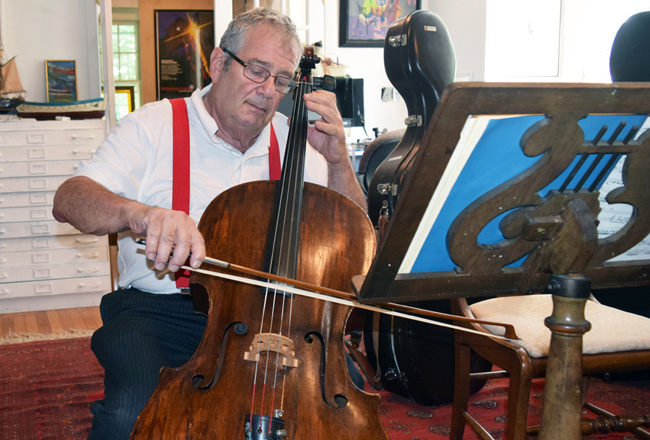Cello and cinema: The two worlds of Westport’s Joel L. Freedman

It is not uncommon for an entrepreneur to run two businesses simultaneously. But for multitasking longevity, 76-year-old Joel L. Freedman is clearly a master of balancing two endeavors.
On one hand, Freedman has run an independent teaching business since he was a student at New York University in the mid-1960s. After moving to Westport in 1992, he branded this operation as Westport Cello School. During this time, he also moved into independent filmmaking by launching Cinnamon Productions, which has turned out an acclaimed series of nonfiction films. And while music and movies have not overlapped, he is at work merging his twin passions in a new documentary called “Cello.”
Born in New York City and raised in Hastings-on-Hudson, Freedman came to the cello when his father rejected his initial request to study trumpet and when the youth expressed disinterest in learning the drums. He studied with Francesca Church, a student of the legendary cellist Pablo Casals, and he recalled an anecdote from his lessons that taught him the value of maintaining a skill.
“A reporter contacted Casals around 7 a.m. and asked him, ”˜Maestro, why are you practicing so early in the morning?”™ And Casals said, ”˜Because there is always room for improvement.”™ The thing about music that is so wonderful is that you can always keep reaching ”” there is never an end to it. Now, if I picked up a book and read it cover to cover, there is a finite end where it would stop. But music keeps going and I try to instill that in my students.”
Freedman received a music scholarship from NYU and would go on to perform (including an appearance at Carnegie Hall) and record. And while he would also begin playing jazz bass, Freedman insisted the cello”™s appeal goes beyond mere instrumentalism.
“I love the sound and the tonality of it,” he said. “It is very much like the human voice.”
While at NYU, Freedman”™s first roommate was Bob Fiore, who would later go on to create the documentary classic “Pumping Iron.” This residential pairing would prove to be serendipitous.
“One day, Bob came in and said, ”˜I got an Arriflex (a movie camera). Wanna come out and shoot some film?”™ We had a 100-foot load of black-and-white film, and we went shooting in Washington Square Park. I had a good time.”
Freedman created short films at NYU and the editor on his projects was Martin Scorsese. In 1968, Freedman teamed with fellow student Bruce Joel Rubin (a future Oscar-winning screenwriter) to create their own film company called Cinnamon Productions ”” and the spicy name came with a Beatles inspiration.
“There was Apple with the Beatles, so why not Cinnamon?” recalled Freedman.
Into the 1970s, Freedman found a successful niche as a documentary filmmaker. He collaborated with Philip F Messina on “Skezag” (1970), a study of Vietnam War veterans enmeshed in drug addiction. Robert Redford narrated his 1976 featre “Broken Treaty at Battle Mountain,” which documented the story of the Western Shoshone of Nevada in their legal struggle to regain 24 million acres of land promised to them by the federal government in the 1858 Ruby Valley Treaty. Freedman would return to Native American subjects throughout his career, and even detoured to Hollywood for a stint as executive producer on the feature “Brainstorm” starring Natalie Wood and Christopher Walken. He later expanded into self distribution via his We Make Movies brand, and his films have played in festivals, theaters and on television broadcasts around the world.
And through all of his cinematic projects, Freedman continued to pursue his work as a cello teacher. He provides lessons for 14 students. At one point he was instructing 22 aspiring cellists, but he reduced his work load in order to devote more time and energy to his students. Freedman charges $100 per hour for adult students and $85 per hour for schoolchildren, and he offers a scholarship discount for youth from lower-income families.
“I won”™t do it for free because, if you do something for free, then people don”™t value it,” he added.
In addition to his “Cello” documentary, Freedman is looking to return to narrative filmmaking with a biopic on rock legend Janis Joplin. As an independent filmmaker, Freedman is also on the hunt for funding sources, usually from foundations and private grants.
“Occasionally, I will have an executive producer come in to raise money,” he said. “Financing is always an issue for independent filmmakers.”
After more than a half-century of his dual pursuits, Freedman has no thoughts of dropping either one.
“Why should I?” he said. “Some people say, ”˜Gee, you”™re a Renaissance man.”™ And I say, ”˜Nah. I love to play the cello and I love to make movies.”™ ”